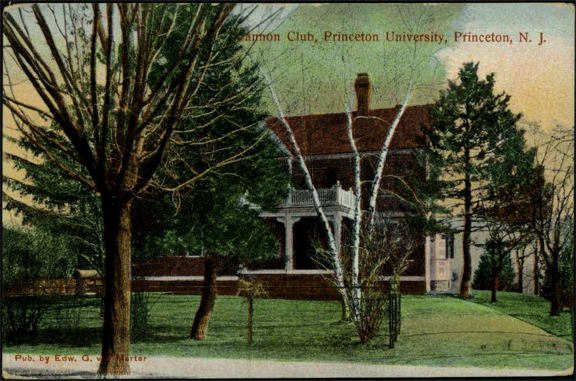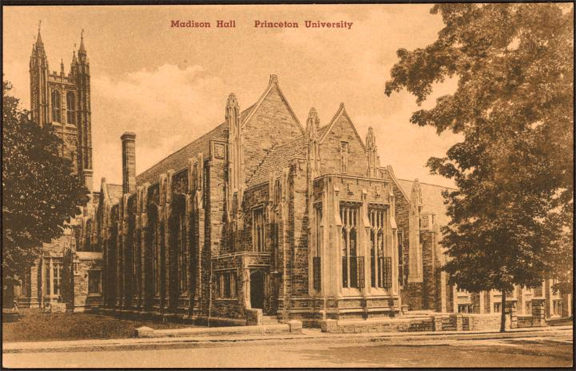“I have a mind to join a club and beat you over the head with it.”
– Groucho Marx
It’s February, and the young Princetonian’s mind, overheated from first-semester exams, turns to thoughts of bicker. Seemingly, it has been so forever.
In 1968, 250 or so classmates and I (about 30 percent) chose not to bicker, and essentially all assumed we were acting against an institution that had gone unassailed since the first Ivy Club building opened in 1883. Most felt the clubs and/or the bicker process itself was too powerful, that the prevailing ICC solution of 100 percent bicker was inadequate if not cold-bloodedly cruel, and that some type of “viable social alternative” needed to be put in place. When the Goheen administration came through with two, the strengthened Wilson College and Stevenson Hall, we figured we had done the necessary, and the campus finally could move on to more substantive worries, like Vietnam and the single wing and Co-Ed Week and Jimi Hendrix.
So we fast-forward to May 2010, and find a big-name University task force triumphantly issuing a groundbreaking report on its exhaustive study of a crucial campus sore point … the eating clubs and bicker. Not only has the 42-year interim not served to settle those questions, but here at Nostalgia Central, it re-resurrects our old buddy Santayana, who chortles at us all yet again for forgetting the past and thus being doomed to repeat it. In fact, had we in 1968 paid a bit more attention to the ebb and flow of the Street over the prior decades instead of assuming we were coming up with anything fresh, we might have better understood what needed doing and what would need to be relentlessly followed up. Or maybe we would have become so fatalistic as to save our energy in the first place – who knows?
I’ve come to regard the club/University friction as the moral equivalent of kudzu, ceaselessly climbing over everything: You brutally hack it back during the day, and then it regains the territory while you sleep. For a 127-year debate, the points of contention are strikingly few and pithy, but they give new zest to the concept of intransigence. In no particular order (that changes frequently, anyway), the gripes involve:
Food – The supposed reason for all of this hubbub, you do have to admit that the University’s approach to gustatory glory has seen mixed results over the decades (Commons’ shepherd’s pie may be legendary, like Mephistopheles, even when Princeton itself is long forgotten).
Student fees – Inefficient clubs always have cost more than University meals, good or bad. After decades of complaints about forcing clubsters on financial aid to pay the difference, the University now covers the average cost of club meal contracts … to a chorus of complaints for not covering social fees, too.
Facilities – Those Street rockpiles cost a lot to heat and repair (see “inefficiency” above), and some grad boards are richer than others, so clubs whose rosters wane can decrepitate or die with stunning rapidity, and have. Or they raise student fees even more.
Social life – If club events vanished, the University would have to creatively fill the resulting entertainment and interpersonal gaps. In 130 years it has never had to, so it hasn’t.
Bicker (including feeder organizations) – Who gets in? Who gets blackballed? Who’s on your team? Who’s in your frat? One club or multi? In the rooms or in the clubhouses or in the archway? Groups or singles? Ties or ascots? Tweeds or suits? Ginger or Mary Ann? Lord, please, please spare me.
Alcohol – The very first contract between Ivy and the College in 1883 that allowed the first permanent clubhouse banned alcohol from the premises. As the University, the country, and the Great State of Snooki subsequently have bungled their way through multiple fashionable liquor policies, up to and including Prohibition, the clubs are no longer dry (ya think?) but perpetually confused.
Intriguingly, there are even significant potential issues that never seemto arise: residential clubhouses, for example (weirdly, the last to approach this may have been club nemesis Woodrow Wilson 1879, who wanted to make them the centers of residential quads). Or on the opposite pole, banishment: Despite a constant inability to transcend the old problems, almost everyone is amicably agreed to the clubs being kept in a limited role. In either extreme, meaningful exchanges of whys and why-nots seem to hover in some mystical fog.
And with all deference to the current report, which has some very intelligent ideas – saving money on insurance for the clubs through the University, more flexible club meal plans, replacing bicker wholesale, some sort of rapprochement with the admission office – we really have been here before. Back in 1968, I now realize, we still had been here before. Back in 1940, the Interclub Council itself (headed by its president, Bob Goheen ’40) proposed reforms, and we still had been here before. I think my favorite uprising – the first of any import that was entirely student-generated – was the Cleveland Revolt of 1917. Based on the idea that the clubs were operating “against the best interests of the University,” thus seemingly in sympathy with Wilson (only seven years gone), this attempt to keep members of the Class of 1919 out of bicker proposed as an alternative a University Hall (student center) adjacent to the new Commons, with extensive recreation facilities and eating areas for upperclassmen. The movement developed some instant heft due in large part to its spokesman and guiding light, Richard F. Cleveland ’19, who was the eldest son of the late ex-president and University trustee, Grover Cleveland; by March, 100 of the class – almost 30 percent (sound familiar?) – chose not to bicker. Incidentally, one of those (not a big deal then, because he was just a public high school kid from Somerville) was J. Douglas Brown ’19, who went on to be the architect of the U.S. Social Security system and the dean of Princeton’s faculty for 21 years. President John Grier Hibben 1882 responded to the sophomore group’s beseechings by … doing nothing. Timing (as in the later case of World War II obscuring the Goheen reforms) played a fateful role; World War I completely distracted and changed everything at Princeton for a couple of years, Cleveland went off to the Marines, and afterward the Roaring Twenties were upon us and the anticlub sentiment was washed away in bathtub gin.
Speaking of which, the 1917 boycott even may have had some residual effect on the ardent Cottage man Scott Fitzgerald ’17, whose electric prose in This Side of Paradise came to embody the zenith of the Street in the Twenties. He wrote in 1940, soon after the Goheen ICC reforms were announced and just prior to his death while reading Your Favorite Periodical, of his desire to abolish the “ragged squabble of club elections with its scars of snobbishness and adolescent heartbreak.” Imagine that, the creator of the Jazz Age picking Mary Ann over Ginger.













No responses yet